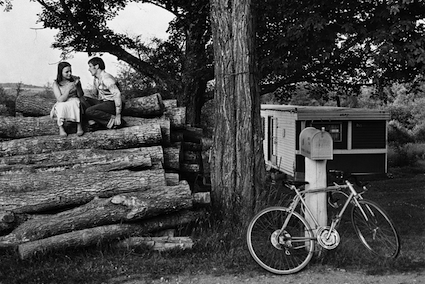A graduate from Reed College with a degree in sociology, Rubin had
originally come out to the East Coast from Oregon to enroll at the then
Maine Photographic Workshops (now the Maine Media Workshops) in
Rockport. After documenting the effects of the early 1980s recession on
families nearby, he wanted to see how the economic downturn was being
handled by locals far from the highways, historic lighthouses and second
homes of the Maine coast. On a tip from a friend, Rubin headed inland
and settled upon an abandoned shack as his home base and a schedule of
hitching four to eight hours between the countryside to take pictures
and Rockport to develop them.Taking prints back to his subjects as a thank-you for their time and
trust, Rubin was eventually let into the lives of local families—as well
as some of their homes to crash on floors and couches—as he continued
his work throughout Central Maine.What he has witnessed is a part of the country largely unbuffeted by
the usual economic ups and downs seen elsewhere. For many in the area
times are always tough. According to the U.S. Bureau of Economic
Analysis, per capita income has been increasing in Somerset County but
has ranked at or near the bottom among Maine’s 16 counties throughout
the many years of Rubin’s project. Residents get by through
resourcefully cobbling together seasonal and part-time jobs, hunting,
fix-it know-how and the support of their communities.“When I met some of these families, I was completely in awe of them
in many ways,” said Rubin, now an assistant professor of art in the
Photography Program at Penn State University. “I think as an outsider
and someone who didn’t have the background that they did, I was really
quite taken by how they survived, by their strength, by their
resourcefulness.”
Please find Tara Godvin’s full article, with a generous slideshow of Steven Rubin’s work, at TIME Lightbox. Many thanks to Alyce Ornella of the Spindleworks Art Center in Brunswick, Maine for leading us to this work
